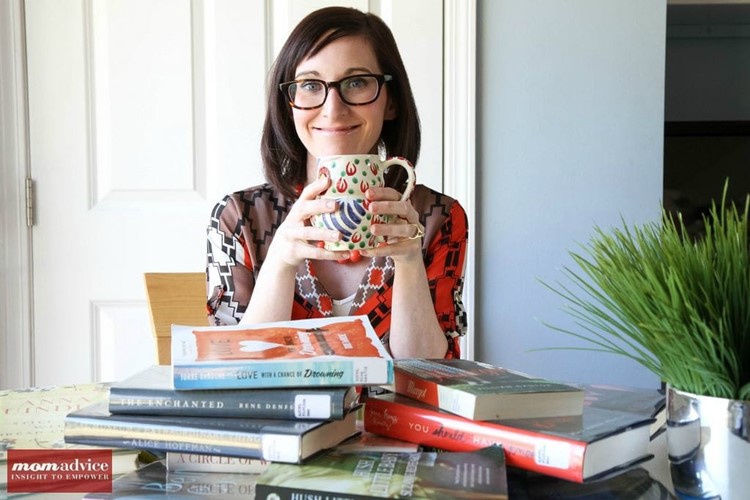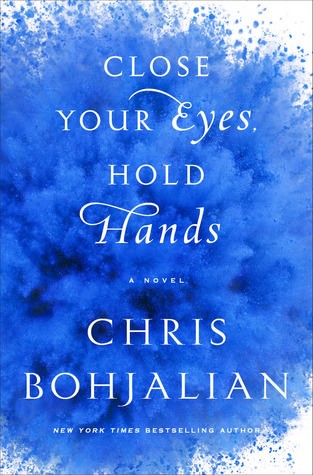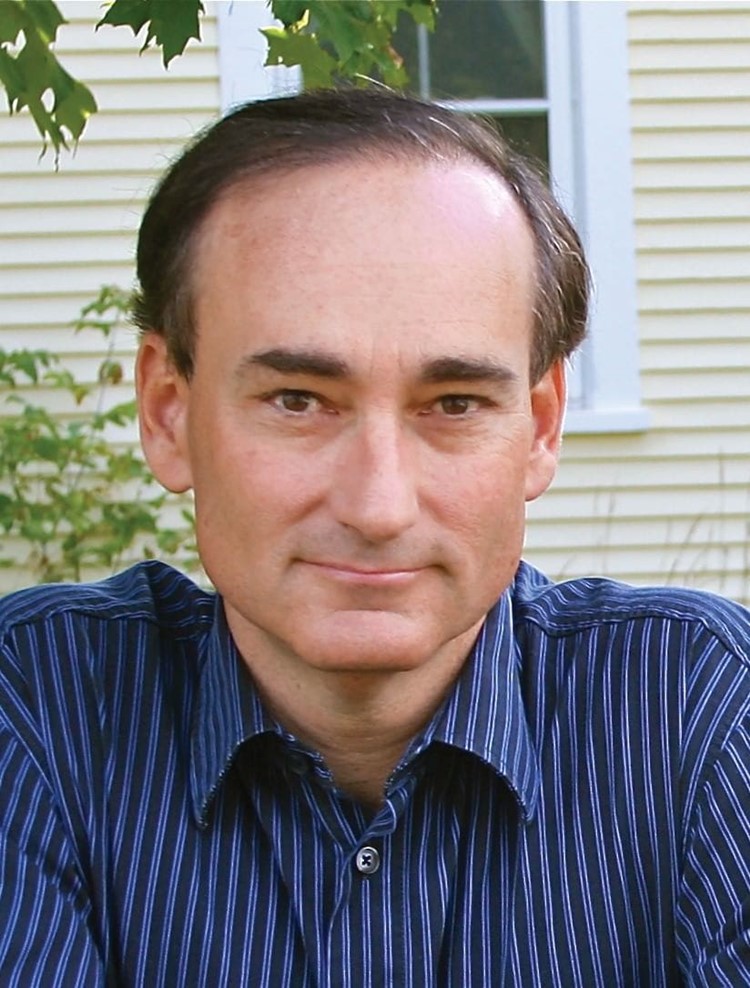
Some interviews are extra, extra special. This is one of them. Everything I have ever read by Chris Bohjalian has moved me and I was thrilled when I got an advance reader of his new book, Close Your Eyes, Hold Hands, from NetGalley. When I closed the final pages, I sent Chris a message and asked if he might consider doing an interview here. His email back was one of the most sincere, genuine, and kindest responses to an interview request ever. Not only is he genuinely in love with his characters and getting to share his stories, but it is quite evident that he is just as passionate about the people who read his words. Getting to share about this book, in his release week, is an honor and I feel privileged to say that I got to have this conversation with him. I count myself lucky to get to share this interview with you and I hope that you will race right out and buy this book.

I truly cannot imagine the amount of research and time it would take to take on a book like this. In Close Your Eyes, Hold Hands, Chris Bohjalian proves himself as a seasoned writer, taking on the story of a troubled teenage girl whose town experiences a nuclear meltdown. What makes it doubly heartwrenching is due to her father’s alcoholic past, he is the chief administrator of the plant and her mother, Mira, also works there as a communications specialist. He is the one that the town blames for the disaster and the death of 19 people. Now orphaned and unwanted, Emily feels like she is not safe in her town and this leads her down a path of destruction that will pull at your heartstrings as a parent and put her in many situations that are brutal in nature.
Not only does Bohjalian capture the voice of this teenage girl so perfectly, but the depth of research on the repercussions of this disaster on a town, and an unlikely blending of Emily Dickinson poems woven throughout (the fictional Emily’s favorite poet) tie this novel up beautifully. Although heartbreakingly tragic, it is one that I could not put down in the final pages.
My only regret was that the epilogue was not expanded more and we could see more of what happened after Emily received treatment.
This book does contain language, violence, & sexual situations.
Grab your morning coffee and let’s chat with Chris about this amazing book!

With seventeen bodies of work under your belt, I would think that it would be hard to come up with a fresh new plot, yet you did that with Close Your Eyes, Hold Hands, and it is phenomenal. How did you come up with the idea to tackle a story based around a nuclear meltdown? Is this something that has always fascinated you?
First of all, thank you so much. I appreciate that immensely.
The truth is, some of my novels demand considerably more research than others. For “Midwives,” for example, I must have interviewed easily sixty or sixty-fives midwives, ob-gyns, lawyers, EMTs, and moms and dads who had their babies at home.
But Close Your Eyes, Hold Hands? Not nearly as much. Emily Shepard’s voice came to me a few days after Christmas 2012, and it came to me fully formed.
Part of the reason why I found the voice so easily, I think, is that I’ve written about teens in trouble often over the years as a newspaper columnist. I’m a big fan of an organization in Burlington, Vermont called Spectrum Youth & Family Services, and the terrific work they do. I’ve met a lot of their kids. I’ve heard the stories and seen their faces. I’ve met the young adults who are going to be just fine, and the ones who – due to mental illness or substance abuse or bad choices or a cataclysmic home life – are heading for disaster.
I also know some of the Spectrum staff. I went to college with Annie Ramniceanu, for instance, who served for years as their associate executive director. She’s also an immensely gifted therapist and counselor. One day when I was having lunch with her, she started telling me how some of the kids – the teens who are falling through the system – would build igloos against the Vermont cold out of trash bags filled with wet leaves, and I knew instantly the novel I wanted to write.
As my 20-year-old daughter, Grace Experience, would tell me when she finished reading the first draft of this novel, “Dad, please take this as a compliment, because I mean it that way: Your sweet spot as a novelist is seriously messed up young women.” I know she’s right.
Emily Dickinson and her poems play a big part in the fictional Emily’s life and Emily really wants her life & words to be like Emily Dickinson. Was Emily a favorite poet of yours or did you develop this entirely around this story?
I’ve always loved Emily Dickinson’s poetry and the mysteries that surround her life. Moreover, as a novelist I’ve often wondered about the choices she made about whether (or not) to publish her extraordinary body of work. And, yes, I went to Amherst College, where her spirit hovers over the community. Sometimes it seems to me as if half the buildings I lived in on campus were named after someone she knew.
Emily is perfectly voiced as a teenager. Some of the lingo, I am embarrassed to say, I almost had to look up. How do you, as a male author, get a perfectly pitched teenage female voice for our narrator?
I think in some ways the voice came together because of all of those teens I interviewed over the years. I still have the columns and I can still recall vividly some of their stories – and so much of their separate ordeals.
I also need to give a big shout-out to my daughter, Grace. Often when I was writing, I would be at a loss to find the right synonym for a word or to capture the precise expression that a really smart teen girl would use, and so I would text her. I would ask, “What’s a hip synonym for ‘tattoo?’” Or “I need another expression for ‘hook-up.’ Any ideas?” And she would text me back something that would work. Trust me, you would not have found the word “bitchcakes” in the novel without her. She was wonderful.
Finally, whenever I write across gender – which I do all the time – I focus first on the things that link us as people. Then, after that, I can begin to examine the particularities of gender.
There were many, many difficult moments that I had reading about Emily’s life when she is homeless, particularly, when she takes Cameron under her wing. Were there any scenes in particular that were difficult for you to write or anything you had to step away from?
Yes. As a dad of a daughter, I found it difficult to write about Emily Shepard’s cutting and the way she is sexually exploited by Poacher.
But I loved writing about her relationship with Cameron, and the way she looks out for him. She might make a lot of bad parenting decisions, but when it comes to that boy – to paraphrase Emily Dickinson – her life really does stand a loaded gun.
Did writing this novel make you think about nuclear disasters differently? Do you have more or less fear about these situations becoming a reality?
I learned a bit about how nuclear plants work – thanks to Arnie and Maggie Gundersen at Fairewinds Energy Education. But I must confess, I still find nuclear power absolutely baffling.
But the Fairewinds website is incredibly interesting.
And, yes, nuclear power does make me nervous. The exclusion zone in my novel in Vermont is small compared to the actual exclusion zone around the Fukushima Daiichi plant in Japan.
If you could tell anyone to read one book (other than your own) what would that book be?
“Room,” by Emma Donoghue. What makes this novel so remarkable is not merely how authentically Donoghue captures the voice of a five-year-old boy, but the deft way she slowly conveys the horrific reality of a mother and son’s captivity.
If you want a poignant, powerful novel about a mother’s desperate love for her child, it doesn’t get better than this.
You can connect with Chris Bohjalian on Facebook or on his website! I’m always thankful for these moments with writers and I hope you will pick up this amazing book! You can always connect with me on GoodReads,through our books section of our site, and you can read our entire Sundays With Writers series for more author profiles. Happy reading, friends!
*This post contains affiliate links!
*This post contains affiliate links!